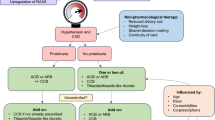Abstract
The Modification of Diet in Renal Disease (MDRD) study showed for the first time that controlling blood pressure is critically important in slowing the progression of proteinuric renal disease (24-h proteinuria of 1.0 g or more). Furthermore, it was found that the greater proteinuria, the more important it was to achieve excellent blood pressure control. The MDRD analysis also suggested that this paradigm may be particularly important for blacks with proteinuric renal disease. Surprisingly, the MDRD data showed that a blood pressure of 125/75 mm Hg was superior to a blood pressure of 135/85 mm Hg in slowing the progression of renal disease. Thus, so-called hypercontrol of blood pressure is needed to slow the progression of proteinuric renal disease. Studies in patients with diabetic glomerulosclerosis also have provided evidence as to the importance of achieving the low blood pressure goal to slow the progression of the glomerulopathy. In summary, strict control of blood pressure (125/75 mm Hg or less, if tolerated) is recommended to slow the progression of proteinuric renal disease. Furthermore, the greater the proteinuria, the more important it is to achieve this target blood pressure to slow the progression of renal disease.
Similar content being viewed by others
References and Recommended Reading
Brazy PC, Stead WW, Fitzwilliam JF: Progression of renal insufficiency: role of blood pressure. Kidney Int 1998, 35:670–674. This article provides an extensive review of the evidence showing that hypertension is associated with the progression of renal disease.
Klahr S, Levey AS, Beck GJ, et al.: The effects of dietary protein restriction and blood pressure control on the progression of chronic renal disease. Modification of Diet in Renal Disease Study Group. N Engl J Med 1994, 330:877–884.
Peterson JC, Adler S, Burkart JM, et al., for the Modification of Diet in Renal Disease (MDRD) Study Group: Blood pressure control, proteinuria, and the progression of renal disease. The Modification of diet in Renal Disease Study. Ann Intern Med 1995, 123:754–762.
Burton C, Harris KPG: The role of proteinuria in the progression of chronic renal failure. Am J Kidney Dis 1996, 27:765–775.
Remuzzi G, Ruggenenti P, Benigni A: Understanding the nature of renal disease progression. Kidney Int 1997, 51:2–15.
Abbate M, Zoja C, Rottoli D, et al.: Antiproteinuric therapy while preventing the abnormal protein traffic in proximal tubule abrogates protein- and complement-dependent interstitial inflammation in experimental renal disease. J Am Soc Nephrol 1999, 10:804–813. The data discussed in Reference 5 are updated in this article and new data on complement and the progression of renal disease are provided.
Apperloo AJ, deZeeuw D, deJong PE: Short-term antiproteinuric response to antihypertensive treatment predicts long-term GFR decline in patients with nondiabetic renal disease. Kidney Int 1994, 45(Suppl 45):S174-S178.
Rossing P, Hommel E, Smidt UM, Parving H-H: Reduction in albuminuria predicts diminished progression in diabetic nephropathy. Kidney Int 1994, 45(Suppl 45):S145-S149.
Hebert LA, Bain RP, Verme D, et al., for the Collaborative Study Group: Remission of nephrotic range proteinuria in type I diabetes. Kidney Int 1994, 46:1688–1693.
Estacio RO, Jeffers BW, Hiatt WR, et al.: The effect of nisoldipine as compared with enalapril on cardiovascular outcomes in patients with non-insulin-dependent diabetes and hypertension. N Engl J Med 1998, 338:645–651. This work is discussed in some detail in this review.
Breyer-Lewis J, Burl T, Bain R, Lewis EJ, for the Collaborative Study Group: Effect of intensive blood pressure control on the course of type I diabetic nephropathy. Am J Kidney Dis, in press.: Please update.
Coggins CH, Breyer JA, Caggiula AW, et al., for the Modification of Diet in Renal Disease (MDRD) Study Group: Women and men in the MDRD study: a gender analysis of participation in the study protocol and of renal outcomes. Ann Intern Med, in press.: Please update.
Hebert LA, Kusek JW, Greene T, et al., for the Modification of Diet in Renal Disease Study Group: Effects of blood pressure control on progressive renal diseases in blacks and whites. Hypertension 1997, 30:428–435.
Mejia AD, Egan BM, Schork NJ, Zweifler AJ: Artefacts in measurement of blood pressure and lack of target organ involvement in the assessment of patients with treatmentresistant hypertension. Ann Intern Med 1990, 112:270–277.
Fang J, Madhavan S, Cohen H, Alderman MH: Isolated diastolic hypertension. A favorable finding among young and middle-aged hypertensive subjects. Hypertension 1995, 26:377–382.
Blank SG, Mann SJ, James GD, et al.: Isolated elevation of diastolic blood pressure. Real or artifactual? Hypertension 1995, 26:383–389.
Klahr S, Breyer JA, Beck GJ, et al., for the Modification of Diet in Renal Disease Study Group: Dietary protein restriction, blood pressure control, and the progression of polycystic kidney disease. J Am Soc Nephrol 1995, 5:2037–2047.
Hall WD, Kusek JW, Kirk KA, et al., for the African-American Study of Kidney Disease and Hypertension Pilot Study Investigators: Short-term effects of blood pressure control and antihypertensive drug regimen on glomerular filtration rate: The African-American Study of Kidney Disease and Hypertension Pilot Study. Am J Kidney Dis 1997, 29:720–728.
VanEssen GG, Apperloo AJ, Rensma PL, et al.: Are angiotensin converting enzyme inhibitors superior to beta blockers in retarding progressive renal function decline? Kidney Int 1997, 52(Suppl 63):S58-S62.
Lewis EJ, Hunsicker LG, Bain RP, Rohde RD, for the Collaborative Study Group: The effect of angiotensin-convertingenzyme inhibition on diabetic nephropathy. N Engl J Med 1993, 329:1456–1462.
Ruggenenti P, Perna A, Mosconi, et al., for the GISEN Group: Randomised placebo-controlled trial of effect of ramipril on decline in glomerular filtration rate and risk of terminal renal failure in proteinuric, non-diabetic nephropathy. Lancet 1997, 349:1857–1863.
Author information
Authors and Affiliations
Rights and permissions
About this article
Cite this article
Hebert, L.A. Target blood pressure for antihypertensive therapy in patients with proteinuric renal disease. Current Science Inc 1, 454–460 (1999). https://doi.org/10.1007/s11906-999-0063-0
Issue Date:
DOI: https://doi.org/10.1007/s11906-999-0063-0




